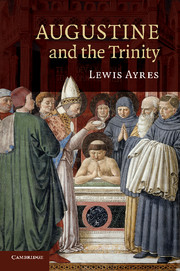Book contents
- Frontmatter
- Contents
- Acknowledgements
- List of abbreviations
- Introduction
- Part I Origins
- Part II Ascent
- 4 The unadorned Trinity
- 5 Per corporalia … ad incorporalia
- 6 A Christological epistemology
- Part III Into the mystery
- Part IV Memory, intellect and will
- Epilogue: Catching all three
- Bibliography
- Scripture index
- General index
- References
4 - The unadorned Trinity
Published online by Cambridge University Press: 06 December 2010
- Frontmatter
- Contents
- Acknowledgements
- List of abbreviations
- Introduction
- Part I Origins
- Part II Ascent
- 4 The unadorned Trinity
- 5 Per corporalia … ad incorporalia
- 6 A Christological epistemology
- Part III Into the mystery
- Part IV Memory, intellect and will
- Epilogue: Catching all three
- Bibliography
- Scripture index
- General index
- References
Summary
With this chapter a new section of the book begins, one that focuses upon the ascent from belief to understanding that is central to Augustine's mature vision of our attempts to grow in knowledge of the Trinity. I will attempt to sketch key aspects of the relationship between belief and understanding as they are apparent between 400 and 410, although I will occasionally range more widely. This chapter begins in the period during which Augustine most likely began writing the De trinitate. My initial concern will be with the summary of Trinitarian belief that Augustine offers near the beginning of De trinitate 1 and which I suggest dates from the earliest stratum of the work. My first goal is to explore some of the new vocabulary and new methods of summary apparent in this text. At its end, however, we find a statement of the persons' inseparable operation that is highly austere in form, articulating relationships without any explanatory terminology of a philosophical or analogical nature. The linguistic austerity of this statement parallels that intrinsic to the Latin anti-Monarchian traditions on which we have seen Augustine draw, but it also suggests the need for a wider investigation into how Augustine understands the relationship between the text of Scripture and doctrinal summary statement. To understand this relationship is to understand much about how Augustine sees the task of doctrinal exegesis and the basic statement of Christian faith prior to the work of understanding proper.
Information
- Type
- Chapter
- Information
- Augustine and the Trinity , pp. 95 - 120Publisher: Cambridge University PressPrint publication year: 2010
